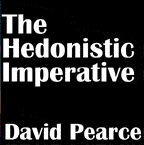







4. Objections.
No 24
Advanced genetic engineering and nanotechnological paradise-construction may yield states of conscious existence so supremely wonderful and god-like that the notion of chemically fine-tuning them will seem absurd. What trans-Heavenly Super-Being would wish to contaminate the natural beauty of his or her soul-stuff with alien dirt? Yet some boring level-headedness about prospective time-scales is in order. It is true that the human genome of three-billion-odd base-pairs will be decoded within a decade. A far greater problem for intelligently encephalised paradise-production is the combinatorial explosion issue. This arises, quite inevitably, from a genotype's differential expression in differing environments. Airily invoking "genetic algorithms" and "quantum computation", for instance, is not wrong; but it tends to gloss over the formidable technical difficulties first to be overcome.
In the meantime, many people alive today will want biologically underwritten fulfillment for themselves and their loved ones. Born, tantalisingly, in the Transitional era, they will have only the suspect stopgap of enhancements to contemporary psychopharmacology to fall back on. Their access to comparatively cheap-and-cheerful paradises born of quick-and-dirty chemical fixes will, no doubt, seem crude and makeshift by the exalted lights of our more distant posterity. This doesn't mean next century's pharmacotherapies should be damned with the knee-jerk spectre of "Drugs" conjured up by our own era's ill-judged recreational excesses. For one of the paradoxical effects, for instance, of a mind-healing strategy using even present-day selective serotonin reuptake blockers can be an enhanced sense of undrugged "normality" in the user. Such a sense can coincide with a biographically abnormal brightening of mood. Unacknowledged everyday states of derealisation, depersonalisation, and indeed other modes depressive weirdness more typically associated with "bad trips" and "bad drugs", are in fact disturbingly common. Low-grade forms are frequent even in the absence of any exogenous agent to precipitate them. Moreover it's worth recalling that a subjective sense of humdrum, drug-naïve normality is itself just a chemically-induced adaptation. Neither we nor our blissful descendants need feel at all "drugged"; even if, in a sense, that's what we are; and always have been. But if we want to glimpse, rather than talk about, the naturalistic implementation of the Promised Land, then our generation(s) at least will need to use the psychoactive tools-of-the-trade.
In any case, given that so much of our very essence comprises the chemical ingredients of our recent meals, it's not as though one's ontological integrity as a pure spirit-being or whatever will be under threat. The difference between a drug and a nutrient, after all, reflects little more than the accidents of evolutionary history.
E-mail Dave : dave@hedweb.com